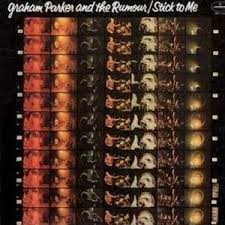GRAHAM PARKER AND THE RUMOUR : STICK TO ME
- Stick To Me
- I'm Gonna Tear Your Playhouse Down
- Problem Child
- Soul On Ice
- Clear Head
- The New York Shuffle
- Watch The Moon Come Down
- Thunder And Rain
- The Heat In Harlem
- The Raid
Label : Vertigo
Release Date : October 1977
Length : 36:44
Review (AllMusic) : Graham Parker and the Rumour's third new studio album to be released in 18 months finds the bandleader running short of top-flight material; "Thunder And Rain" and "Watch The Moon Come Down" are up to his usual standards, but songs like "The Heat In Harlem" find him dangerously out of his depth. As a result, although fiercely played, this star-crossed release (it had to be re-recorded when the first version suffered technical problems) is a cut below Parker's first two albums.
Review (Rolling Stone) : Graham Parker is unquestionably the most exciting new rock performer since Bruce Springsteen. He is a ferocious singer and an obsessively lyrical writer with a sense of rock bounded by (sort of) Presley and Dylan plus a deft touch for R&B and reggae. His band, the Rumour, is as tough and inspired as he is. Parker has pounded out two previous LPs and an EP since he emerged a year and a half ago, and there is a feeling of utter necessity to every minute of that music. "Pourin' It All Out," "Heat Treatment," "Don't Ask Me Questions" and "Back to Schooldays" are already classics to those who know them. Stick to Me is the most anticipated rock record since Born to Run, and it should have put the stamp of broad-based success on this stage of Parker's career. Instead, it raises more questions than it answers. While Parker is occasionally as mesmerizing as ever - particularly on "New York Shuffle" and "The Raid" - Stick to Me lacks any song as fine as those listed above, exposing unexpected songwriting weaknesses. Still, Parker sings great, and the band is still playing flatout and relentless rock & roll. But almost every production touch (as well as some of the basic recording itself) obscures the songs' drive and power, making murky some of the most lucid music around. To say that Parker has writing weaknesses is hardly to dismiss him as a rock writer. The album's most dire failure, "Heat in Harlem," is also its most ambitious song and points an expansive direction for Parker's future vision. The degree to which he has cannibalized earlier songs ("Back to Schooldays" for "New York Shuffle"; "Heat Treatment" for "Stick to Me") is disappointing, but hardly disastrous. Parker's problems as a lyricist are more complex. He has a flair for verbal imagery, but his best work has been wrought from enormous anger and bitterness: "Don't Ask Me Questions" flails at the church; "Schooldays" stomps education; "Pourin' It All Out" is a determined fling at romantic futility. But on Stick to Me he concentrates mostly on straight romance with much less passionate results; what seemed invigorating is now only sentimental. In "New York Shuffle," where he gets off his best lines ("I got to get out quick/Before I get as sick/As the people living in this town"), he's not on familiar turf; it shows in the song's facile cuteness. These are problems that will be solved naturally as Parker's art matures. The failures of Nick Lowe's production are more distressing because they're less readily remedied. Parker has never made a record that kicks as hard as his music - his records take weeks to sink in, not because the music is inaccessible but because the recording clouds it. Lowe, who produced Howlin' Wind, repeats his mistakes here. Once again, the tracks are so muddy that, while you hear the band rocking out, you can only feel it at the most extreme volume. The emphasis is always on Parker's voice, which exacerbates his long-windedness. Some of the production flourishes are not to be believed: the female chorus on "Problem Child" makes a decent song ludicrous, and the horn chart on Ann Peebles' "I'm Gonna Tear Your Playhouse Down" is not even high-level hackwork. It is painful enough to be disappointed in this record for the things that are Graham Parker's fault. It is completely unnecessary, however, to again suffer through such an amateurish technical presentation, which veils a great and potentially essential rock talent. If Parker's advisers are devoted to him, they'll get him to a professional recordist, but quick. Graham Parker's talent begs him to conquer the world and spin it on one finger - and he could do it, too. But Stick to Me is only what the title implies - a holding action. Anyone who's heard Parker will hang around, but you'll pardon our impatience: this boy's time is now.
